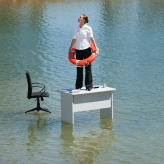 While it is highly likely that you have an insurance policy that will cover your small or medium-sized business in the event of a disaster, chances are you don’t have business interruption insurance. The majority of smaller companies tend to overlook interruption policies, believing (or at least hoping) that regular insurance will be enough to protect them. But in the face of rising natural disasters, you may want to think again.
While it is highly likely that you have an insurance policy that will cover your small or medium-sized business in the event of a disaster, chances are you don’t have business interruption insurance. The majority of smaller companies tend to overlook interruption policies, believing (or at least hoping) that regular insurance will be enough to protect them. But in the face of rising natural disasters, you may want to think again.
So why do small and medium-sized organizations tend to forego business interruption insurance policies? Chances are it, like so many things, comes down to cost. But can you really afford to ignore the additional protection that interruption insurance offers, or is it safe to cut corners and hope that your regular business insurance will have you covered in the event of a disaster?
While an interruption insurance policy may cost you anywhere from $750 to $10,000 or more (the cost is normally dependent on the size of your business), the fact is that your standard insurance policy will not cover you completely when a catastrophe strikes.
Take for example the spate of superstorms that have ravaged the United States over the past decade. From Hurricane Katrina to the more recent Sandy, small businesses and enterprises throughout the US have been left devastated after feeling the wrath of Mother Nature. While a best-case scenario may entail losing a few days sales during a power outage, at the other end of the scale you could find yourself dealing with a destroyed warehouse, an office that no longer has a roof, or thousands of dollars worth of stock destroyed by flooding.
And the reality is that your regular insurance is probably not going to reimburse you for storage or relocation costs if you need to move operations elsewhere, temporarily or otherwise. The majority of policies will only cover the loss of, or damage to, physical items like stock, equipment and property. They will usually not cover you for any loss in profit if a disaster means that you need to temporarily cease trading. On the other hand, tightly drawn up business interruption insurance should cover you in the event you need to move. It should also cover a decrease in sales due to power failures that shut your communication lines down, as well as a drop in profits due to delays in the delivery of stock or equipment.
Think the chances of a natural disaster affecting you are still slim despite the scenes of chaos and devastation reported in the media? Consider that a recent survey conducted by insurance giant Allianz found that there are now typically 600 major incidents per year – compare that to the previous 400 per annum and it doesn’t take a mathematician to figure out that disasters are on the rise.
So, as a small or medium-sized business owner, what do you need to know before you consider purchasing interruption insurance? If you’re thinking of adding interruption coverage to your existing policy, first record your current net income – but watch out because, if your net profit is high, you might be hit by a low per-incident limit. You could find your insurer has limited your coverage and left you inadequately protected.
Is business booming? If you are undergoing rapid growth, keep records spanning many months so you have proof of revenue increase. Without this, you will not be able to forecast month-on-month profit growth and your insurer might cap coverage at the rate of the previous year’s profit, not at your accelerated one. Be aware, too, that the type of interruptions you want protection for should reflect the areas covered in your general business policy. If your existing policy doesn’t include coverage for fire damage, neither will your interruption insurance.
There are many other aspects of an interruption policy to take into account – such as add-ons that protect you in the event of a power outage (something that standard policies normally don’t normally cover), and knock-on effects caused by a disaster at your supplier’s end.
Once you have taken out interruption insurance, should you have to use it then the most important aspect for you will be getting reimbursed. Crucially, you need to be able to provide your insurer with as many details concerning profit loss as possible. Consider storing files electronically, either offsite or in the cloud. That way, if your office or store is destroyed, you’ll still have access to your documents – and a far greater chance of recovering your losses.
If you’d like to learn more about protecting your data, files and documents, as well as about business continuity planning to help you get back up and running should disaster strike, please get in touch with our team today.